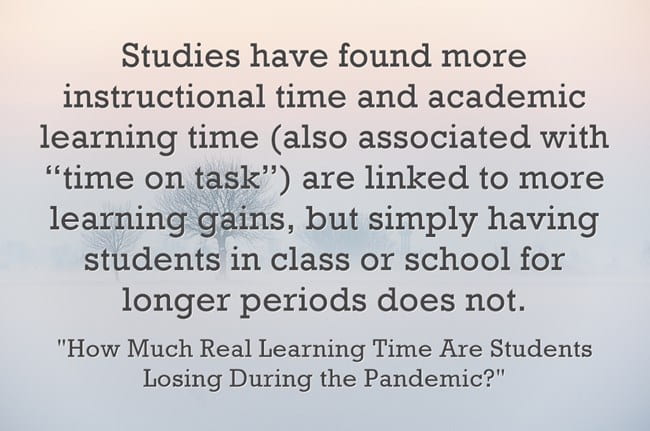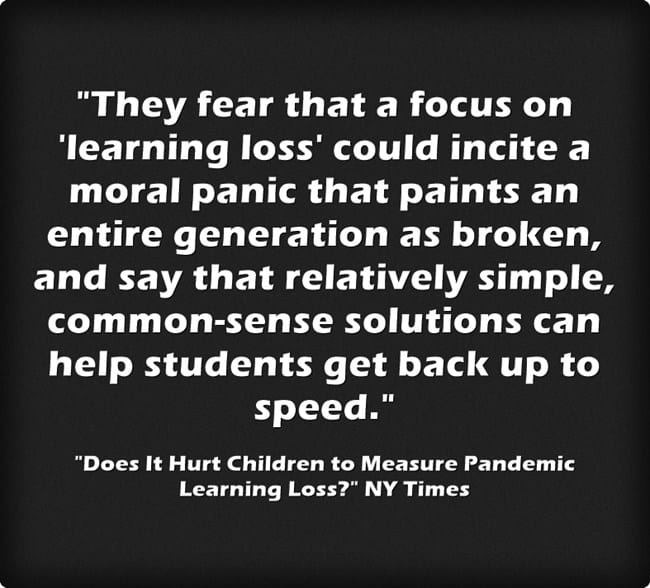The phrase “learning loss” is the latest buzz word in education circles, and I’m very concerned that the dominant narrative at this time could compound any pandemic damage we’ve all been experiencing over the past year.
The question is NOT “How do we add more school time to students’ schedule post-pandemic?”
The question IS “How can we best support students academically and emotionally post-pandemic?”
Unfortunately, it appears to be the former, not the latter, question driving the public discussion.
In terms of research, the two places where I recommend to start are:
- Sarah Sparks’ piece in Ed Week today, How Much Real Learning Time Are Students Losing During the Pandemic?
- The Best Resources On The Idea Of Extending The School Day
For teacher and student voice, check out:
- My two pieces in The Washington Post, Teacher: What’s missing from calls for summer school to stem ‘learning loss’ & The kind of teaching kids need right now
- Neema Avashia’s guest post at my Ed Week column, Students Respond to Adults’ Fixation on ‘Learning Loss’
- Marian Dingle’s guest post at my Ed Week column,The Idea of ‘Learning Loss’ Begs Us to Ask, ‘Loss From What?’
I’m happy to add additional resources I find, or that readers suggest.
If you’d like to bring more student voice to the discussion, here are the questions that Neema asked her students:
- During the pandemic, what are things that you feel like you’ve lost?
- During the pandemic, what are the ways that you have seen yourself grow or learn new things?
- Many adults in education right now are very focused on the idea of “learning loss.” They think that kids are falling behind academically during the pandemic. What do you want those adults to know about you and your experience during the pandemic?
A Washington, D.C. City Councilwoman saw Neema’s column and modified here questions in this way:
I’d be grateful to any teacher who would ask their students these Qs & share w me:
During the pandemic, what are things that you feel like you’ve lost?
During the pandemic, what are the ways that you have seen yourself grow or learn new things?
What do you need this summer?
— Christina Henderson (@chenderson) February 3, 2021
Perhaps we can work together to bring sanity back to forefront…
Addendum:
Is There Any Teacher Who Would NOT Want To Participate In “The Imagining September Project”?
My Students On What They’ve Lost & Learned, & What They Need
What does the evidence say about… increased instructional time? is from FORA Education.
Here’s an excerpt from Does It Hurt Children to Measure Pandemic Learning Loss?:
(Teachers should freely and loudly proclaim their thoughts and/or frustrations and/or concerns about how people not in the classroom use the phrase “learning loss” and said people trying to chide them are likely missing the larger points they’re raising. IMO.) pic.twitter.com/CIRFr5WhJ5
— Jennifer Binis (@JennBinis) April 9, 2021
YES, LET’S STOP TALKING ABOUT A “LOST YEAR” – AND “LEARNING LOSS”
Pandemic learning gains: Resilience. Responsibility. Lunch. is from The Christian Science Monitor.
‘Learning Loss, in General, Is a Misnomer’: Study Shows Kids Made Progress During COVID-19 is from Ed Week.
What Students Are Saying About ‘Learning Loss’ During the Pandemic is from The NY Times Learning Network.
Many worry about ‘learning loss,’ but has this really been a lost year for CPS students? is from The Chicago Sun Times.
Huge re “learning loss.” 👇🏆
“If we each answered what it means for students to be ready for various math concepts, our responses would likely be very different, as would each student’s prior understandings and experiences.” https://t.co/bKNoK9uRs1
— Dan Meyer (@ddmeyer) May 25, 2021
Integrating the Science of Learning and Culturally Responsive Practice by Zaretta Hammond is in the latest issue of The American Educator.
NEW: A first look at our Learning Loss Handbook, we analyze the connections between the testing industry’s financial interests and the “learning loss” narrative. Should we be concerned about “learning loss”? #restorehumanityhttps://t.co/uzyNOxJv3A pic.twitter.com/dx05GNWGiG
— Human Restoration Project (@HumResPro) July 2, 2021
I have a lot of respect for @alexanderrusso and I agree with just about everything @WhiteRhinoRay says in this piece https://t.co/a6I6QklBoR
— Larry Ferlazzo (@Larryferlazzo) July 26, 2021
ANOTHER DAY, ANOTHER LAMENTATION ABOUT LEARNING LOSS
When privileged people continue to push the narrative of “learning loss,” this is what we get. Instead, they should be pushing for smaller class sizes, devices for all students, and better ways to spend the extra money we have. #Mtbos #Iteachmath #Edchat https://t.co/Teh3ZuyqL7
— Bobson Wong (@bobsonwong) August 17, 2021
Students Learned So Much More During the Pandemic Than We Realize. Just Ask Them. is from Ed Surge.
CRITICAL – & I MEAN CRITICAL – POINT ABOUT “LEARNING LOSS” THAT IS BEING…..LOST
“No, Temporarily Closing Schools Is Not Like Invading Iraq”
What Can You Do About Pandemic Learning Losses? is from Greater Good. I’m not thrilled about the headline, but it’s a decent article.
I also think it’s useful to unpack “learning loss” into at least two different kinds: pic.twitter.com/ClnTCkQFeQ
— Dylan Wiliam (@dylanwiliam) May 5, 2022
Remediation is needed when hierarchies are strong. No point in teaching addition of fractions if students can’t generate sequences of equivalent fractions…
— Dylan Wiliam (@dylanwiliam) May 5, 2022
MUST-READ COLUMN ON “LEARNING LOSS” IN THE NEW YORKER
How shocking! — except if you asked any K-12 teacher https://t.co/FQ1gpy0F5I
— Larry Ferlazzo (@Larryferlazzo) November 16, 2022
Here are some ChatGPT comments on the term ‘learning loss’ pic.twitter.com/MzEuXVD5Wf
— Larry Ferlazzo (@Larryferlazzo) December 5, 2022
QUOTE OF THE DAY: JASON REYNOLDS ON “LEARNING LOSS”
The “Learning Loss” Trap is from Rethinking Schools.
IF YOU’RE GOING TO READ ONE THING TODAY, MAKE IT “WE’RE HUGE IN LEARNING LOSS!”





This article helps with the conversation around focusing on acceleration versus remediation. Well-worth adding to the dialogue.
https://www.the74million.org/article/how-a-diverse-school-district-is-using-a-strategy-usually-reserved-for-gifted-students-to-help-everyone-overcome-covid-learning-loss/